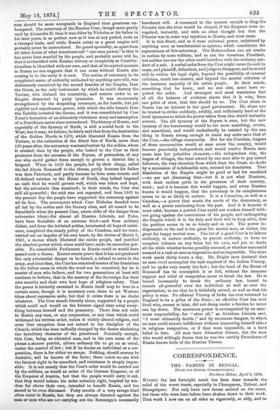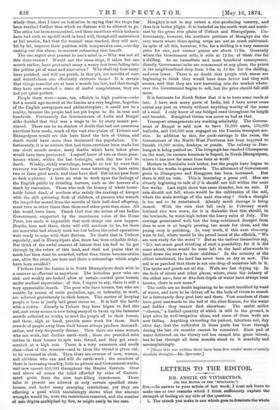CORRESPONDENCE.
THE - FAMINE IN BENGAL.
[FROM OUR SPECIAL CORRESPONDENT.]
Northern Behar, April 8, 1874. Wrrunt the last fortnight much has been done towards the relief of the worst tracts, especially in Chumparun, Tirhoot, and Bhaugulpore. Not only have new forces arrived on the scene, but those who were here before have shaken down to their work. That work I now see on all sides so vigorously, so ably, and so wisely done, that I have no hesitation in saying that the stage has been reached further than which no distress will be allowed to go. The crisis has been surmounted, and those exertions which hitherto have bad such an up-hill work in hand will, though still maintained at full tension, find that the summit once reached, they will now, bit by bit, improve their position with comparative ease,—to-day casting out this abuse, to-morrow enhancing that benefit.
The one regret ever present to one's mind is,—Why was not all this done sooner? Would not the same steps, if taken but one month earlier, have prevented many a weary foot from falling into the pitiless pit of want and starvation ? Who shall say how many have perished, and will yet perish, in that pit, ere months of care and watchfulness can effectually extricate them? It is certain that things remedial are at least a month too late, and that though they have now reached a state of useful completeness, they are not yet quite perfect.
People there were—some, too, officials in high position—who but a month ago sneered at the famine as a very bugbear, begotten of the English newspapers and philanthropists ; it could not be a reality, because the people had not yet begun to die in tens and hundreds. Fortunately the Governments of India and Bengal alike decided that that was a stage to be by every means pre- vented. There can be no shadow of doubt that had not enormous exertions been made, much of the vast rice-plains of Tirhoot and Bhaugulpore would ere this have fared the fate of Orissa, and death would have more than decimated the population. Un- fortunately, it is as certain that had these exertions been made but one short month sooner, many deaths which have taken place would have been prevented. I myself know of two or three poor- houses where, within the last fortnight, each day has had its death. Weakly, sickly starvelings, brought so low by want that recovery was hardly possible, have come tottering in, have eaten two or three good meals, and then have died. But let me pass from so dark a picture. I have no wish to work upon the feelings of the English public by detailing horrors, such as the horrors of a death by starvation. Those who seek the history of whole house- holds found dead, of mothers who satisfy the cravings of hunger with the still quivering flesh of children, of parents who wrench the longed-for morsel from the mouths of their half-dead offspring, must turn to other times than these and other pens than mine. All this would have been. Thank God that the action of our Indian Government, supported by the unanimous voice of the Home Press, has made it impossible that such things can now happen. Deaths, here and there, there will still continue to be, for there are some who had already sunk too low before the relief operations were ready to cope with their distress. No doubt that in Tirhoot especially, and in Bhaugulpore also, there has been culpable delay. But think of the awful amount of labour that has bad to be got through by the rulers of this land, and shall not praise that so much has been done be awarded, rather than blame because critics can, after the event, see here and there a miscarriage which might have been avoided?
I believe that the famine is in North Bhaugulpore dealt with in a manner as effectual as anywhere. The homeless poor who are sick and weakly are looked after at certain central poor-houses, under medical supervision ; of this, I regret to say, there is still a very appreciable dearth. The poor who have houses, but who are unable, by reason of caste prejudice, age, or infirmity, to work, are relieved gratuitously in their homes. This matter of keeping people at home is justly laid great stress on. It is half the battle with a native. Already in Tirhoot they have begun to find this out, and every means is now being essayed to break up the immense crowds collected on works, to send the people off to their homes, and there, nigh at hand, provide some work for them. Such crowds of people away from their homes always produce demorali- sation, and very frequently disease. Then there are some women who can work, but decline earth-work ; these are provided with cotton in their houses to spin into thread, and they get remu- nerated at a high rate. There is a very numerous and needy class—that of the weavers—and to them the thread is given out, to be returned in cloth. Then there are swarms of men, women, and children who can and will do earth-work ; the numbers of these is increasing steadily, both on private and Government works, and now exceed 450,000 throughout the famine districts. Over
and above all comes the relief afforded by sales of Govern- ment grain from the now fast-filling storehouses. These
sales at present are allowed at only certain specified store- houses, and under many annoying restrictions, yet they are effecting a good which tantalisingly shows what the amount wrought would be, were the restrictions removed, and the number of sale depOts multiplied by five, as might easily be the case. Monghyr is not to any extent a rice-producing country, an) thus is in better plight. It is bounded on the north-west and north-
east by the great rice plains of Tirhoot and Bhaugulpore. Un- fortunately, however, the northern portions of Monghyr are the very tracts where these spring crops are not so much cultivated. In spite of all this, however, 9 lbs. for a shilling is a very common price for rice, and coarser grains are about 111bs. Generally where the Government sells, it sells at 12 lbs. of clean rice for a shilling. As an immediate and most beneficial consequence, directly Government sales are commenced at any place, the price& in the neighbourhood drop from 9 lbs. to II lbs. for the shilling,. and even lower. There is no doubt that people with stores are beginning to think they would have done better had they sold sooner, and that they are now hastening into the market where- ever the Government begins to sell, lest the price should fall still more.
It is fortunate for North Behar that it is to have some roads at last. I have seen many parts of India, but I have never come across any part so utterly without anything worthy of the name- of a road. I only know of one bridged road throughout its length and breadth. Benighted Orissa was never as bad as that.
Transport arrangements are working admirably. The Govern- ment of Bengal is said now to have 75,000 carts, 175,000, bullocks, and 100,000 men engaged on the Famine transport ser- vice. In addition to this, for pack-carriage in the rains, the- Government of the North-West Provinces has been required to- furnish 10,000 mules, donkeys, or ponies. The railway to Dur- bungah is being pushed on. The telegraph has reached Chumparm on the west, its eastern terminus is Supool, in North Bhaugulpore, where it has now for some time been at work.
Matters in Sonthalia look better, but the people have begun to flock to the works in great crowds. The allotment of Government grain to Dinagepore and Reingpore has been increased. But there is still no rain. This is becoming a great evil. Men are- already beginning to talk of if it should not fall within the next few weeks. Last night there was some thunder, but no rain. If rain should not fall, where would be the cultivation of the soil, where the main sowings of the next rice-crop ? Such a thought is too sad to be entertained. Already much damage is being caused. With the rain that fell early in February much lowland rice was sown, for it is desirable that this should, in the lowlands, be waist-high before the heavy rains of July. The sowings germinated well, but the long-continued drought from then to now is at length proving too much for them, and the young crop is perishing. In very truth, if this next rice-crop were to fail, where would be the proud boast of the officials, " We are now ready for the worst"? But as the natives themselves say, "It's not much good thinking of such a possibility, for if it did- come about, there would be none left in the land afterwards to. hand down the story to their children." In the memory of the oldest inhabitant, the land has never been so dry as now The soil is so parched that there is not one drop of moisture left in it. The tanks and ponds are all dry. Wells are fast drying up. In- the beds of rivers and other places, where, since the infancy of the oldest man, four or five-feet depth of water have always been known, there is now none.* The cattle are no doubt beginning to be much troubled by want- of water, and have to be driven off to the beds of rivers to search for a fortunately deep pool here and there. Vast numbers of these' have gone eastwards to the bed of the river Koosee, for the water' and fodder they cannot find elsewhere. The useful millet " cheena," a limited quantity of which is still in the ground, is kept alive by well-irrigation alone, and some of these wells are. now failing. Anything exceeding the patient, laborious toil, day after day, that the cultivator in these parts has been through during the last six months cannot be conceived. Each pail of water delivered on the thirsty soil has caused him great labour,. but he has through all these months stood to it manfully and uncomplainingly.
• [Since this was written there have been Jiro weeks' more of nearly absolute drought.—ED. Spectator.]



































 Previous page
Previous page